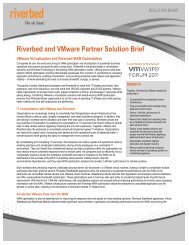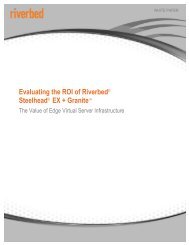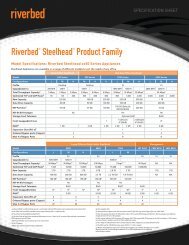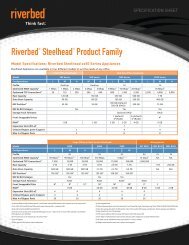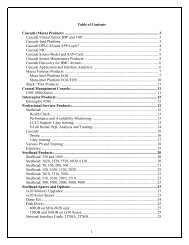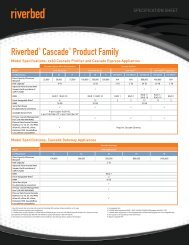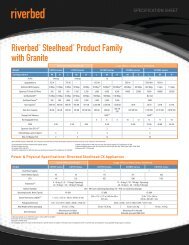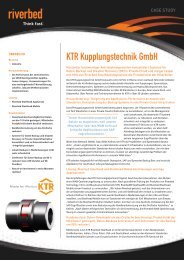Riverbed Optimization System (RiOS) 6.1
Riverbed Optimization System (RiOS) 6.1
Riverbed Optimization System (RiOS) 6.1
You also want an ePaper? Increase the reach of your titles
YUMPU automatically turns print PDFs into web optimized ePapers that Google loves.
<strong>RiOS</strong> Technical Overview<br />
initial download of bulky java applets at startup time, allowing user login and startup to complete in seconds rather than minutes.<br />
The net effect creates significant data reduction for Oracle Forms traffic and additional bandwidth savings, as well as improved<br />
application performance up to 50 times.<br />
Disaster Recovery Acceleration<br />
<strong>RiOS</strong>’s out-of-the-box acceleration of backup and replication operations already generated significant performance gains for data<br />
transfer jobs. Since <strong>RiOS</strong> 4.1, <strong>Riverbed</strong> has had a Behavioral Traffic Recognition algorithm for large-scale data transfers to<br />
accelerate backup and replication jobs even further. The traffic recognition capability identifies a large-scale data transfer flowing<br />
through a Steelhead appliance or Virtual Steelhead and applies some specific system optimizations to enhance the throughput<br />
and handling of high-rate, high-volume backup data sets.<br />
Other Business Continuity improvements enable Steelhead appliances to scale for high-throughput disaster recovery<br />
environments, with up to four Gigabit LAN-side throughput and often up to 3:1 to 8:1 data reduction. These enhancements enable<br />
acceleration of asynchronous replication solutions such as EMC SRDF/A, CA XOsoft, IBM Tivoli Storage Manager, and more.<br />
Steelhead appliances are qualified by EMC for SRDF/A and HDS for Hitachi TrueCopy, Universal Replicator, and H-NAS, along<br />
with other leading storage vendors’ products.<br />
These additional optimizations improve disk utilization, while also dynamically applying data reduction and compression<br />
algorithms. The resulting throughput enhancement further reduces the time required to complete a backup or replication operation<br />
beyond previous acceleration norms. A variety of options including tunable LZ compression, choices like SDR-M or Adaptive SDR,<br />
and granularity to have the data streamlining mode dynamically toggled per flow all enable <strong>RiOS</strong> to deliver the best balance of<br />
high throughput versus maximum bandwidth reduction. Some environments might be highly bandwidth constrained, others may<br />
need the fastest possible throughput, and yet others may need to share the WAN connections between DR operations and other<br />
business applications, and <strong>Riverbed</strong> is extremely high performance and as flexible as required.<br />
Figure-12: SRDF/A and FCIP Illustrated<br />
Virtual Desktop Infrastructure (Citrix and VMware) <strong>Optimization</strong><br />
<strong>Riverbed</strong> can optimize the traffic associated with delivery of virtual desktops for leading solutions like Citrix ICA and VMware View.<br />
This is simply enabled by automatically switching to <strong>RiOS</strong> compression and encryption in place of the less effective native<br />
compression and encryption options in the VDI products. Also <strong>Riverbed</strong> SDR-M can be utilized to efficiently reduce the bandwidth<br />
requirements in memory for high throughput results. Typical results show that up to twice as many desktops can be supported on<br />
the same WAN (by halving the bandwidth requirements of each), and end user response times can improve by up to 80% (over<br />
uncompressed traffic) making for more satisfactory performance. Further, Citrix desktops can be optimized utilizing QoS markings,<br />
to prioritize interactive activities like desktop input and display over less time sensitive operations such as printing.<br />
© 2010 <strong>Riverbed</strong> Technology. All rights reserved. 15




